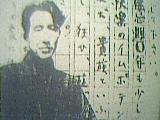
-- post mental --

-- post mental --
from Confessions of a Volcano
I first read Eric Gamalinda in the poetry section of Jingle Magazine,
the poem was later included in the book
Lyrics from a Dead Language. I was not reading Jingle then for
music chords, or song lyrics, but for the Grin Department and Bongga
and Boquilia, where students who used to think wearing espadrils is
cool took time to bitch each other. Then Gamalinda caught my
attention.
More than 15 years and 7 books later, Gamalinda still writes powerful language that stuns and makes me forget what I want to read in the first place.
20. Dazai on the Moon
Tokyo is so large and brightly
lit, it is said to be the only city visible from the moon.
Asia Magazine, 4 February 1990.
Always the question that nagged me was: what after all must a writer do? Even in those days, when the sky was soot-grey with the aftermath of the raids, we asked this question a lot. Is a writer expected to do something else other than write, on pain of not being taken seriously at all> It is as if writing were such menial, meaningless work, and could only be allowed as a hobby. I have thought long and hard about it, thought like a diligent monk stoned to the heights of satori, and this is what I believe: A writer has only to do two things - (1) to write, (2) to be in harmony with the world. The first is easy, and the second -- which requires of him patience for the world and compassion for its foibles -- is next to impossible.
I am here on the moon. From this angle the earth looks like a brilliant, speckled ball floating in thick soup. At certain points, for instance from the brinks of glacial volcanoes, I can see it spinning smoothly, titled on its side: it is huge as a radar dish above us, its winds lashing against the moon's vast deserts, sending dry cyclones of powder and dust.
I have been living here for fifty years.
I keep myself occupied with ire agency reports spilled out by quaint, rotund machines. Oh yes, we have spies and correspondents back there: swift, luminescent sylphs, which people often mistake for cataracts or moonbeams. (I myself have lost all romance for moonlit nights.) These nocturnal spies swoop back with their reports and punch them in the machines, and from the nerve center of it all, our central news room, I sift through them, all of these stories from all over the world. I read every one of them.
Well, nobody else wanted the job, so I got in.
Everyday I can look out, so to speak, all over the world; not just all over, but clear across time as well. How is that possible? On the moon there are many things we can't explain, but we're slowly getting there: many of our physicists have Fulbright scholars everywhere. They gather once a year to sip cocktails (a favorite: Moon on the Rocks) and talk of autumn and the autumn moon.
 I
have been on the moon for a long, long time. In Winthrop,
Massachusetts, a 43-year-old man is accused of killing his hospital
roommate after complaining that the man's snoring kept disturbing
his sleep (AP). In Zambia, white snakes attack a village and eat out
the eyes of all the children. In Beijing, thousands of people are
shot down at Tiananmen Square. In Haiti, Papa Doc Duvalier, an old,
old man, dies in the arms of his furry mistress. In Udorthani, young
men are tonsured into buddhahood. On the West Bank, a house is blown
away. And in Tokyo, the stockmarkets teeter as another evening falls
like nocturnes over the Imperial walls.
I
have been on the moon for a long, long time. In Winthrop,
Massachusetts, a 43-year-old man is accused of killing his hospital
roommate after complaining that the man's snoring kept disturbing
his sleep (AP). In Zambia, white snakes attack a village and eat out
the eyes of all the children. In Beijing, thousands of people are
shot down at Tiananmen Square. In Haiti, Papa Doc Duvalier, an old,
old man, dies in the arms of his furry mistress. In Udorthani, young
men are tonsured into buddhahood. On the West Bank, a house is blown
away. And in Tokyo, the stockmarkets teeter as another evening falls
like nocturnes over the Imperial walls.
I was once described as a man "who cannot tell the unadorned truth." Well, so be it. But in my youth I did look it, truth, as is required most intrepid of us, there in the sallow, claustrophobic bars along the Ginza. I had hoped to die in the war; not to die fighting, because I can think nothing more futile, and meaningless. But to die with the rest of the city, to be fusilladed with bombs there in that collective apocalypse together with everybody else, so that it wouldn't really matter whether one died in the aftermath or not.
But I am here, and the city died before me.
Not, not died: had been rewritten, like figures on a slate. Or, if I am the one dead (a more possible conjecture), then it is the same city I am looking at, sprouting lights and expressways like a sinuous, luminescent vine. One of these days it will reach me, here in my newsroom, my telexicon (telex + icon = lexicon).
But I would have moved on somewhere else.
(Eric Gamalinda's latest book of poetry, Zero Gravity, was published by Alice James Books. He won a Centennial Literary Prize 1898-1998 his novel My Sad Republic, published by UP Press.
The illustrations are from the Anvil edition of Confessions of a Volcano.)